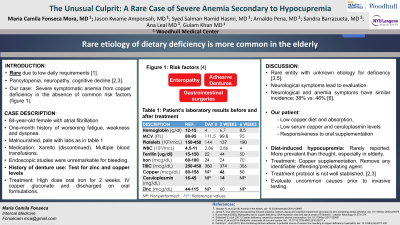Back


Poster Session E - Tuesday Afternoon
Category: Small Intestine
E0659 - The Unusual Culprit: A Rare Case of Severe Anemia Secondary to Hypocupremia
Tuesday, October 25, 2022
3:00 PM – 5:00 PM ET
Location: Crown Ballroom

Has Audio

Maria Camila Fonseca, MD
Woodhull Medical Center
Brooklyn, NY
Presenting Author(s)
Maria Camila Fonseca, MD1, Jason Kwame Amponsah, MD1, Syed Salman Hamid Hashmi, MD2, Arnoldo J. Pena Quesada, MD1, Sandra Barrazueta, MD1, Ana Leal, MD1, Gulam Mustafa Khan, MD3
1Woodhull Medical Center, Brooklyn, NY; 2NYU Langone Medical Center/ Woodhull Medical Center, Brooklyn, NY; 3NYU Langone Medical Center/ Woodhull Medical Center, New York, NY
Introduction: Acquired Copper deficiency is often overlooked, as daily requirements are significantly low[1]. Depletion of cellular lines, neuropathy, and cognitive decline have been associated[2,3]. In the absence of common risk factors such as enteropathies, or denture adhesives, copper deficiency is atypical[4].There are no available reports on such rare occurrences. We present a case of severe symptomatic anemia from copper deficiency in the absence of common risk factors.
Case Description/Methods: An 84-year-old female with history of atrial fibrillation presented with one-month complaint of worsening fatigue, weakness and dyspnea. She was malnourished, pale with a small non-bleeding external hemorrhoid on rectal examination. On admission had hemoglobin of 4g/dL, macrocytosis 111.5fL, platelet count of 144 103/mcL and white blood cell count of 2.86x103/mcL with neutropenia 1.49x103/mcL. Xarelto was discontinued and multiple blood transfusions given (goal hemoglobin more than 7g/dL). Ferritin, iron and total iron binding capacity remained low despite 2 weeks of high dose oral iron regimen. Endoscopic studies were unremarkable for bleeding. After thorough evaluation for other causes of anemia, giving her history of denture use, zinc and copper levels were tested. Copper and ceruloplasmin were deficient, 46mcg/dL and 14mg/dL respectively, and zinc was normal 60mcg/dL. She was started on IV copper gluconate and discharged on oral formulations. At six weeks follow-up, her neutropenia and thrombocytopenia resolved, and hemoglobin remained above 7g/dL.
Discussion: Copper deficiency is rare given high dietary source and low daily requirement, except in cases of enteropathies, bariatric surgery or zinc intoxication, yet the actual source of deficiency is unknown[3,5]. Copper deficiency evaluation is triggered by neurological symptoms (38%) despite its similar incidence to cooper anemia (46%)[6]. Given the patient’s poor copper-rich diet and absorption, evident by her low serum copper and ceruloplasmin levels, and responsiveness to oral supplementation, confirms that the rare etiology of dietary deficiency is more common that initially thought. Copper replacement is ambiguous, however removing offending agent and supplementing might suffice[2,3,9]. Diet induced hypocupremia is rarely reported but may be more prevalent than thought, especially in elderly. Evaluation for less common causes should be considered prior to invasive and expensive testing and allow for timely treatment.
Disclosures:
Maria Camila Fonseca, MD1, Jason Kwame Amponsah, MD1, Syed Salman Hamid Hashmi, MD2, Arnoldo J. Pena Quesada, MD1, Sandra Barrazueta, MD1, Ana Leal, MD1, Gulam Mustafa Khan, MD3. E0659 - The Unusual Culprit: A Rare Case of Severe Anemia Secondary to Hypocupremia, ACG 2022 Annual Scientific Meeting Abstracts. Charlotte, NC: American College of Gastroenterology.
1Woodhull Medical Center, Brooklyn, NY; 2NYU Langone Medical Center/ Woodhull Medical Center, Brooklyn, NY; 3NYU Langone Medical Center/ Woodhull Medical Center, New York, NY
Introduction: Acquired Copper deficiency is often overlooked, as daily requirements are significantly low[1]. Depletion of cellular lines, neuropathy, and cognitive decline have been associated[2,3]. In the absence of common risk factors such as enteropathies, or denture adhesives, copper deficiency is atypical[4].There are no available reports on such rare occurrences. We present a case of severe symptomatic anemia from copper deficiency in the absence of common risk factors.
Case Description/Methods: An 84-year-old female with history of atrial fibrillation presented with one-month complaint of worsening fatigue, weakness and dyspnea. She was malnourished, pale with a small non-bleeding external hemorrhoid on rectal examination. On admission had hemoglobin of 4g/dL, macrocytosis 111.5fL, platelet count of 144 103/mcL and white blood cell count of 2.86x103/mcL with neutropenia 1.49x103/mcL. Xarelto was discontinued and multiple blood transfusions given (goal hemoglobin more than 7g/dL). Ferritin, iron and total iron binding capacity remained low despite 2 weeks of high dose oral iron regimen. Endoscopic studies were unremarkable for bleeding. After thorough evaluation for other causes of anemia, giving her history of denture use, zinc and copper levels were tested. Copper and ceruloplasmin were deficient, 46mcg/dL and 14mg/dL respectively, and zinc was normal 60mcg/dL. She was started on IV copper gluconate and discharged on oral formulations. At six weeks follow-up, her neutropenia and thrombocytopenia resolved, and hemoglobin remained above 7g/dL.
Discussion: Copper deficiency is rare given high dietary source and low daily requirement, except in cases of enteropathies, bariatric surgery or zinc intoxication, yet the actual source of deficiency is unknown[3,5]. Copper deficiency evaluation is triggered by neurological symptoms (38%) despite its similar incidence to cooper anemia (46%)[6]. Given the patient’s poor copper-rich diet and absorption, evident by her low serum copper and ceruloplasmin levels, and responsiveness to oral supplementation, confirms that the rare etiology of dietary deficiency is more common that initially thought. Copper replacement is ambiguous, however removing offending agent and supplementing might suffice[2,3,9]. Diet induced hypocupremia is rarely reported but may be more prevalent than thought, especially in elderly. Evaluation for less common causes should be considered prior to invasive and expensive testing and allow for timely treatment.
Disclosures:
Maria Camila Fonseca indicated no relevant financial relationships.
Jason Kwame Amponsah indicated no relevant financial relationships.
Syed Salman Hamid Hashmi indicated no relevant financial relationships.
Arnoldo Pena Quesada indicated no relevant financial relationships.
Sandra Barrazueta indicated no relevant financial relationships.
Ana Leal indicated no relevant financial relationships.
Gulam Mustafa Khan indicated no relevant financial relationships.
Maria Camila Fonseca, MD1, Jason Kwame Amponsah, MD1, Syed Salman Hamid Hashmi, MD2, Arnoldo J. Pena Quesada, MD1, Sandra Barrazueta, MD1, Ana Leal, MD1, Gulam Mustafa Khan, MD3. E0659 - The Unusual Culprit: A Rare Case of Severe Anemia Secondary to Hypocupremia, ACG 2022 Annual Scientific Meeting Abstracts. Charlotte, NC: American College of Gastroenterology.
